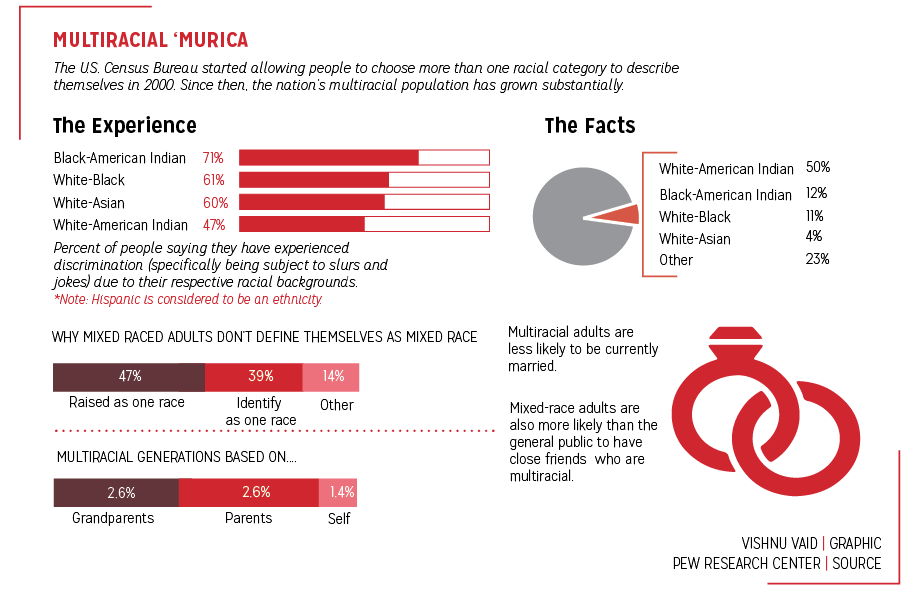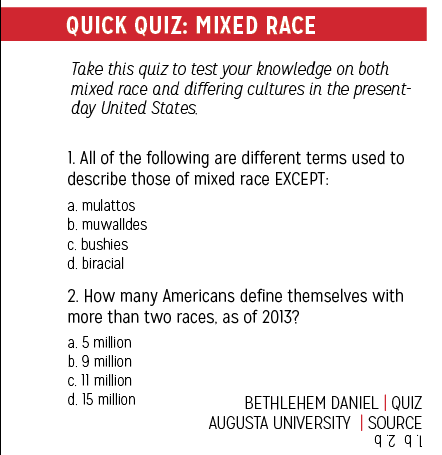Junior Kiki Koniaris is Korean, Pennsylvanian Dutch and Grecian. Despite being of mixed race, Koniaris said she believes race should not define a person.
“I feel like (how you define yourself) should be based off of personal attributes in general,” Koniaris said. “Because if you start defining everyone by race, then at a certain point, it becomes  this idea that we separate ourselves based on race, and I think history has shown us that that’s not the best idea. But with that being said, sometimes you want to say, ‘I’m different from everyone else because this is how my culture worked out.’”
this idea that we separate ourselves based on race, and I think history has shown us that that’s not the best idea. But with that being said, sometimes you want to say, ‘I’m different from everyone else because this is how my culture worked out.’”
But while Koniaris said race shouldn’t define people, the very recognition of people of mixed races is still relatively new in this country. In the 1967 Loving v. Virginia case, the U.S. Supreme Court struck down previous laws prohibiting interracial marriage. In 2000, the U.S. Census Bureau first allowed people to identify themselves. With those statistics in mind, in the just last 50 years, the population of people of mixed races has increased exponentially. According to a 2015 Pew Research study, between 2000 and 2010, the number of white and black biracial Americans has more than doubled, while people of white and Asian backgrounds have increased by 87 percent.
This inclusion of mixed races has led to societal changes, as well as some discomfort form those who discuss those changes. According to Matthew Hayes, assistant professor of political science at IU, when identifying people of mixed race, there has been a general accompaniment of ‘politically correct’ terminologies. That language comes both from those who are not of mixed backgrounds, as well as from those who are.
Hayes said via email, “Race is very much a social construct, and so there is not one ‘right’ approach to talking about people who identify as mixed race. In general, American society does not presently view those with mixed racial heritage as a separate category or race … So there is not one ‘politically correct’ term to use to refer to people of mixed race; some mixed race people might identify themselves as one race, others might identify as multiple, and still others might  see themselves as a distinct blend of their racial heritage.”
see themselves as a distinct blend of their racial heritage.”
When talking about race and categorizing people of multicultural backgrounds based on these physical attributes, both Hayes and Koniaris said they believe caution should be taken as race can be a sensitive subject.
Hayes said, “A common thing that minorities have to face—and lighter skinned or mixed race minorities in particular—is a questioning of their background by white interlocutors. People of mixed race will often be asked, ‘What is your background?’ or, ‘Where are you from?’ These questions, which would generally be unthinkable or uncommon to ask of a white person, reinforce the idea that people who are not white are somehow ‘other,’ and that their race must be clearly defined and compartmentalized.”
Koniaris said, “Some people like to enjoy defining themselves their race, saying, ‘Oh, I’m mixed and I’m proud of being mixed,’ and some people don’t so you just have to careful with how you approach race and when you talk to people. Just keep an open mind.”
Junior Noah Huber, who is both African American and Caucasian, said he has been called names due to his mixed heritage. According to the aforementioned Pew Research study mentioned earlier, about 61 percent of the surveyed black-whites and 60 percent of white-asians have been subjected
to racial slurs or jokes.
“(I have been called) ‘Oreo,’ black on the outside, white on the inside,” Huber said. “I’d say that there’s a certain degree of judgement that comes with being of mixed race. There’s a predisposition, judging people before they know the person, before they know what the person has done, what they have said, or anything about the person of mixed race.”
According to social studies teacher Michael O’Toole, political correctness, especially when it comes to discussing race, is used to scapegoat or marginalize people of multicultural backgrounds.
“Just because the terminology has been used for so long, it doesn’t mean that it’s correct or that people are trying to be ‘politically correct.’ It’s almost a tool to shut down all arguments; ‘Oh you’re being politically correct? Then I’m done with this conversation,’ rather than asking people of multicultural backgrounds what their beliefs are and how they want to be identified,” O’Toole said.
Both Huber and Koniaris said a common misconception about being of mixed race is you can only identify as one or the other.
“People ask what side that I think I am and my answer is always that I’m not on one side, I’m not one race, obviously, I’m multiple races,” Huber said. “So I think that it’s important to remember that you should not judge someone based on where they come from, but instead on who they are, and who they are is completely based on what they chose to do and what their actions are.”
O’Toole said, “Race has to do with physical characteristics, so people make the assumption that if they express certain physical characteristics over others, then they can then draw stereotypes, prejudice, bias out of these, rather than asking those people (how they want to be defined); and I don’t understand why it’s so difficult to ask those people how they want to be treated or how they want to be categorized and how we have to put them into a box as a category and marginalized, rather than getting to know them as a human being.”
O’Toole and Koniaris said one way to avoid forming prejudice in general is interacting with people who are different than you. Therefore, through the contact theory, exposure to people of mixed race will help eliminate the construction of false stereotypes and misconceptions.
Micol Seigel, department of American studies associate professor at IU, said via email, “Just as our ideas of ‘race’ change, our ideas of what it means to be racially mixed change. It’s important t
o resist the idea that there is a set number of races who used to be neatly and tidily distinct in a schema that has only recently begun to blur. That notion posits the biological reality of race, a tremendously toxic political myth that anti-racist people should try to resist.”
Koniaris said, “(To the people who still hold prejudice toward people of mixed races), I’d say, ‘Get with the times.’ We live in 2016, we are moving on so far. The idea that we can still stay in these race bubbles a is such an antiquated idea and destroys a lot of the stuff that we have been working towards for equality. Looking at it through a global lens, defining ourselves by race is an antiquated notion.” 



















![Joseph Broman, Mu Alpha Theta sponsor, grades tests for his honors precalculus/trigonometry class. Broman said, “I’m retiring from the Math Club next year and I’m just going to do Mu Alpha Theta so I can focus on that one and we can do more [speaker series] first semester.”](https://hilite.org/wp-content/uploads/2024/03/IMG_9502-1200x900.jpg)











![British royalty are American celebrities [opinion]](https://hilite.org/wp-content/uploads/2024/03/Screenshot-2024-03-24-1.44.57-PM.png)




















![Review: “The Iron Claw” cannot get enough praise [MUSE]](https://hilite.org/wp-content/uploads/2024/04/unnamed.png)
![Review: “The Bear” sets an unbelievably high bar for future comedy shows [MUSE]](https://hilite.org/wp-content/uploads/2024/03/unnamed.png)
![Review: “Mysterious Lotus Casebook” is an amazing historical Chinese drama [MUSE]](https://hilite.org/wp-content/uploads/2024/03/0.webp)
![Thea Bendaly on her Instagram-run crochet shop [Biz Buzz]](https://hilite.org/wp-content/uploads/2024/03/IMG_0165-1200x838.jpg)
![Review: Sally Rooney’s “Normal People,” is the best book to read when you are in a time of change [MUSE]](https://hilite.org/wp-content/uploads/2024/03/20047217-low_res-normal-people.webp)
![Review in Print: Maripaz Villar brings a delightfully unique style to the world of WEBTOON [MUSE]](https://hilite.org/wp-content/uploads/2023/12/maripazcover-1200x960.jpg)
![Review: “The Sword of Kaigen” is a masterpiece [MUSE]](https://hilite.org/wp-content/uploads/2023/11/Screenshot-2023-11-26-201051.png)
![Review: Gateron Oil Kings, great linear switches, okay price [MUSE]](https://hilite.org/wp-content/uploads/2023/11/Screenshot-2023-11-26-200553.png)
![Review: “A Haunting in Venice” is a significant improvement from other Agatha Christie adaptations [MUSE]](https://hilite.org/wp-content/uploads/2023/11/e7ee2938a6d422669771bce6d8088521.jpg)
![Review: A Thanksgiving story from elementary school, still just as interesting [MUSE]](https://hilite.org/wp-content/uploads/2023/11/Screenshot-2023-11-26-195514-987x1200.png)
![Review: When I Fly Towards You, cute, uplifting youth drama [MUSE]](https://hilite.org/wp-content/uploads/2023/09/When-I-Fly-Towards-You-Chinese-drama.png)
![Postcards from Muse: Hawaii Travel Diary [MUSE]](https://hilite.org/wp-content/uploads/2023/09/My-project-1-1200x1200.jpg)
![Review: Ladybug & Cat Noir: The Movie, departure from original show [MUSE]](https://hilite.org/wp-content/uploads/2023/09/Ladybug__Cat_Noir_-_The_Movie_poster.jpg)
![Review in Print: Hidden Love is the cute, uplifting drama everyone needs [MUSE]](https://hilite.org/wp-content/uploads/2023/09/hiddenlovecover-e1693597208225-1030x1200.png)
![Review in Print: Heartstopper is the heartwarming queer romance we all need [MUSE]](https://hilite.org/wp-content/uploads/2023/08/museheartstoppercover-1200x654.png)























![Review: Ladybug & Cat Noir: The Movie, departure from original show [MUSE]](https://hilite.org/wp-content/uploads/2023/09/Ladybug__Cat_Noir_-_The_Movie_poster-221x300.jpg)

![Review: Next in Fashion season two survives changes, becomes a valuable pop culture artifact [MUSE]](https://hilite.org/wp-content/uploads/2023/03/Screen-Shot-2023-03-09-at-11.05.05-AM-300x214.png)
![Review: Is The Stormlight Archive worth it? [MUSE]](https://hilite.org/wp-content/uploads/2023/10/unnamed-1-184x300.png)

